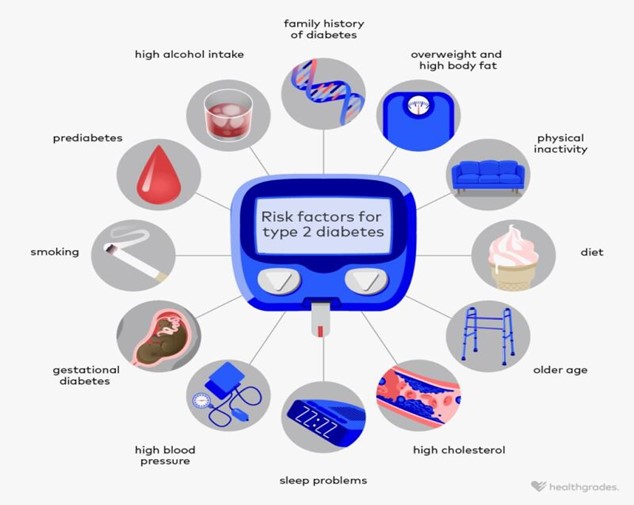Are you REALLY at risk of developing diabetes?
Contrary to popular belief, being an overweight/obese minority is not a main risk factor of developing diabetes, yet diabetes is publicly portrayed as a disease of overweight/obese minorities. Mainstream media ads like tv commercial ads, social media ads, and most public health ad campaigns depict diabetes in this manner, particularly type 2 diabetes. When I see a blood sugar lowering medication commercial ad on TV, I often cringe because they dramatically feed this stereotype. There is always an overweight/obese person of ethnic decent, either African American or Hispanic, leading the commercial to an eventual dancing scene full of other overweight/obese minorities dancing in the background. Yes, diabetes does disproportionately affect certain segments of the population, but being an overweight/obese minority doesn’t automatically place you at risk of developing diabetes.
The main risk factor of diabetes is how our body processes and utilizes blood sugar and there are multiple factors that effect this process. Let’s take a brief look as these risk factors and how they elevate the risk of diabetes development.

Family history: Family history may be the most important risk factor of diabetes. If you have a first degree relative (parents or siblings) with diabetes, your risk of developing diabetes is significantly increased due to genetics. The inability of insulin to not work properly, a propensity to slowly metabolize food causing high blood sugar levels and excessive weight gain, overactive fat cells among other metabolic functions are all genetically inclined. All of these can lead to chronic hyperglycemia and insulin resistance which can lead to diabetes.
Weight: Being overweight or obese significantly increases your risk of developing diabetes. Poor weight management and creeping obesity is a significant risk factor of type 2 diabetes because excessive weight gain has several negative metabolic factors. Creeping obesity is generally a condition of poor diet, lack of exercise, and sedentary behavior along with other modifiable factors.
Physical activity: Physical inactivity is a key modifiable risk factor for type 2 diabetes. Being physical active helps contribute to a healthy metabolic process. Diabetes is a condition of chronically high blood sugar levels. Being physically active helps us burn more energy and the more energy we burn, the lower our blood sugar levels will be.
Diet: Poor diet is also a key modifiable risk factor. If we consistently consume more food than we need, it can lead to chronically high blood sugar levels. All foods not just foods high in sugar, have the ability to be converted into blood sugar and used for energy. Our body just prefers to use a certain type of food for energy, carbohydrates. A lot of carbohydrates are sugary based without any other nutrient making them easier to convert into blood sugar.
Older Age: The older you are, the higher your risk for prediabetes and Type 2 diabetes. As we age, our body’s metabolic processes slow causing chronically high blood sugar levels. Aging causing lower energy levels, muscle atrophy, decreased confidence in completing physical tasks, and decreased physical activity among other things.
High Cholesterol: High cholesterol and diabetes go hand and hand. One can cause the other. Increased cholesterol levels can lead to deterioration of glucose tolerance.
Sleep Problems: Poor sleep can contribute to the development of diabetes by affecting how your body processes glucose. Poor sleep habits can disrupt hormone regulation leading to increased insulin resistance and blood sugar imbalances. Poor sleep habits can also decrease energy levels and slow down metabolic processes causing chronically high blood sugar levels.
High Blood Pressure: Among other things, high blood pressure can lead to insulin resistance which is a key factor in the development of type 2 diabetes.
Smoking: Smokers have a 30 to 40% higher chance of developing diabetes compared to non-smokers primarily due to the effects of nicotine and chemicals in cigarette smoke which can disrupt insulin function and increase insulin resistance in the body, leading to higher blood sugar levels. Chemicals in cigarette smoke can trigger inflammation in the body, further contributing to insulin resistance. Smoking is also associated with increased abdominal fat.
Gestational Diabetes: If you developed diabetes during pregnancy, you are at increased risk of developing diabetes again later in life.
High Alcohol Intake: Regular heavy drinking can reduce the body’s sensitivity to insulin causing chronically high blood sugar levels. Heavy drinking can cause pancreatitis, which is a common cause of diabetes. Heavy drinking can cause weight gain and can also negatively impact glucose regulation.
